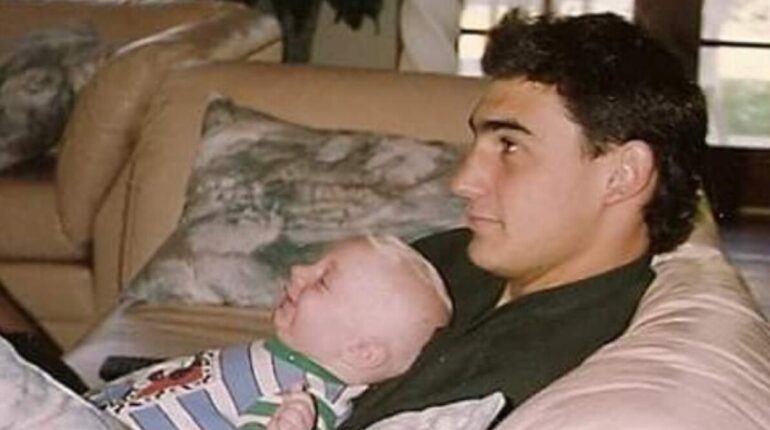📌 After his father’s death, what this nurse did in the hospital corridor will stay with him forever

Posted 21 July 2025 by: Admin
The Longest Vigil: When Family Loyalty Meets Hospital Reality
2019 marked the beginning of what Alek Hermon would later describe as the worst week of his life. His father Michael lay in a coma at a Dublin, California hospital, non-responsive after suffering a traumatic brain injury. The medical machines beeped steadily, but the prognosis remained uncertain.
The Hermon family made a pact that would define their ordeal: someone would remain by Michael’s side at all times. Seven family members divided the intensive care unit shifts, ensuring their patriarch never faced his battle alone. When it came time to choose schedules, Alek volunteered for the hardest hours—those lonely pre-dawn shifts between 3 and 6 a.m.
« It’s by far the most traumatic, difficult thing I’ve ever gone through, » Hermon would later reflect on those endless nights in the sterile hospital corridors.
During these isolated hours, only one hospital staff member provided regular interaction: a nurse named Ray. Ray appeared almost every shift, methodically checking Michael’s vital signs and attending to his basic needs. But their initial encounters left Alek with an unfavorable impression.
Ray’s casual references to Christianity and the power of prayer immediately created tension. Alek, a committed atheist whose father shared the same beliefs, found himself harboring harsh judgments about this well-meaning nurse. The clash between faith and skepticism added another layer of discomfort to an already unbearable situation.
Yet something would soon shift in those quiet morning hours.
Beyond First Impressions: How A Nurse’s Curiosity Changed Everything
That shift began through the pages of science fiction novels. Each night, Alek would pull a chair close to his father’s bedside and read aloud from Michael’s beloved collection—Dune, Isaac Asimov classics, stories that had shaped his father’s imagination for decades.
Ray noticed. More than that, he engaged.
« Oh, I love that book, » Ray would comment as he adjusted medical equipment. « I’ve read this book. » What started as polite observations evolved into genuine literary discussions during those quiet pre-dawn hours.
But Ray’s interest extended beyond shared reading preferences. He began asking real questions about Michael himself. What was he like as a person? What were his interests beyond science fiction? How did he spend his time before the accident?
These weren’t the routine medical inquiries Alek had grown accustomed to from other staff members. Ray wanted to understand the man behind the patient monitors, to see Michael Hermon as more than a collection of vital signs requiring attention.
Week by week, Alek’s initial harsh judgment softened. The nurse he had dismissed for his religious references revealed himself as someone genuinely invested in both patient and family. Ray’s Christianity didn’t disappear, but it no longer dominated their interactions. Instead, a deeper human connection emerged—one built on mutual respect for literature, curiosity about life, and shared concern for Michael’s wellbeing.
The atheist son and the Christian nurse had found unexpected common ground in the intensive care unit’s sterile fluorescent glow.
The Operating Room: Surrounded Yet Utterly Alone
That newfound human connection would soon be tested by medicine’s harshest reality. The diagnosis arrived like a verdict: whole brain death. Michael Hermon’s body remained alive only through mechanical support, but the man Alek had read science fiction to was already gone.
The decision tore through Alek’s chest. Remove life support. Let his father’s final wish as an organ donor give meaning to this senseless tragedy.
The operating room buzzed with controlled urgency. Nearly a dozen doctors and nurses moved with practiced precision, preparing to harvest organs and tissues that would save multiple lives. For Alek, the scene felt surreal—a sterile theater where his father’s death would unfold as medical procedure.
« I’m watching them remove his intubation and his IV, and I watch him flatline and die, » Alek recalled.
The heart monitor’s steady beep dissolved into that terrible, endless tone. Michael Hermon was gone.
But the strangest part wasn’t witnessing death itself. It was experiencing it surrounded by complete strangers. Medical masks concealed every face. Protective equipment rendered each person anonymous. These weren’t the nurses who had cared for his father during those long nights, the doctors who had explained procedures with gentle patience.
« You’re surrounded by people, but they are all completely anonymous because they’re wearing masks and all of this protective equipment… It’s a really strange feeling, of being surrounded by strangers but also being utterly alone. »
In that moment of profound loss, Alek felt more isolated than during those solitary 3 AM vigils.
The Run That Changed Everything: When Strangers Become Angels
Numb and hollow, Alek left the operating room. His father was gone. The medical machinery had served its purpose. Now came the long walk through sterile hospital corridors, each step echoing the finality of loss.
His feet moved automatically down the hallway. No destination. No plan. Just the desperate need to escape that room where strangers in masks had witnessed his father’s final moments.
Then he heard it. Footsteps running. Someone calling his name.
« I hear feet running down the hall and someone calling my name. And I turn around and it’s Ray. »
Ray. The night-shift nurse who had cared for Michael during those darkest hours. The man Alek had initially dismissed for his religious references, then grown to appreciate through shared literary conversations.
But this wasn’t the Ray from the ICU. This Ray was tearing off surgical gear—mask, gloves, protective equipment—revealing himself as one of the anonymous figures who had just assisted in the organ harvest procedure.
« He’s ripping off all of the sterilization gear and I realize he was actually one of the assistants in this room who was going to conduct this surgery. And his eyes are completely full of tears. »
Ray didn’t hesitate. He embraced Alek with the full force of genuine human compassion.
« I remember my knees basically going slack and just crying into this stranger’s chest and him crying like full force, weeping with me. »
In that hallway embrace, surrounded by the antiseptic smell of hospital corridors, two men wept together. Ray had seen the real need at that moment—not medical procedure, but human connection.
« He took my suffering seriously. He took my family seriously. I was a real person to him. »




















